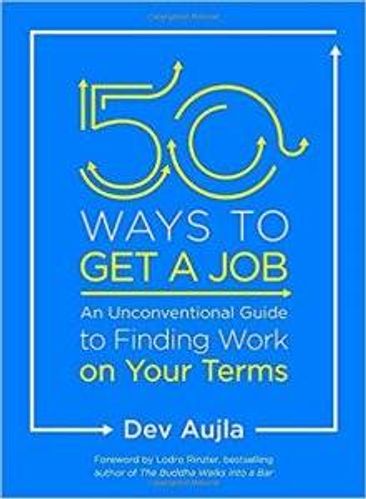When Should You Work for Free?
Advice from the author of '50 Ways to Get a Job'
(This article is excerpted from the new book, 50 Ways to Get a Job: An Unconventional Guide to Finding Work on Your Terms, by Dev Aujla, published by TarcherPerigree.)

Working for free, if you’re looking for a job, should not be your first resort. It can feel like progress — it comes with structure and responsibility, and you may learn something — but it also costs more than just money. It costs you time and mental space, and most importantly it can change your perception of the value your skills have in the market.
It is a big decision. When you have all of this free time during a transition, it can feel like your time is cheap and abundant. It isn’t. There is endless work to do in pursuing lines of inquiry and in learning new skills.
A 'When to Work for Free' Flowchart
This is not to say that you should never work for free.

The typographer, graphic designer and lettering artist Jessica Hische created a flowchart entitled, “Should I Work for Free?” that she made a print of a few years ago and I refer people to it often. In it , there are only a few examples of when you should actually work for free as a freelancer — for your mom, for a nonprofit that you believe in that is not working through an agency or for a friend who has donated an organ to you.
It is sarcastic and warm and yet holds a great deal of truth even for those of us looking for a job. Your value increases in your own mind first, and anything that influences the way you think about that value is worthy of consideration before saying yes for practical reasons.
3 Questions to Ask Yourself
If you have the privilege and the ability, there are certain times that working for free is worth considering. Before you decide to go down this path, answer the following three questions which originally appeared in my first book, Making Good:
1. Who are you going to be around? Will the position give you access to a whole new world of contacts, or will you be spending your days with people you already know?
If the job you are taking involves getting out of a cubicle, you may be better off. Whether it’s representing the company at a trade show, helping coordinate an annual charity ball or attending a conference, the ideal unpaid position should enable you either to get a broad survey of your industry’s social landscape or to build one or two solid friendships with people already firmly established in your field.
2. Will you be able to teach yourself what you need to learn? Every job involves learning on the go. As a volunteer, you should know what you want to learn from this experience and drive your own education. If, for example, having access to the company’s internal workings will allow you to learn something worthwhile, then working for free can be highly valuable.
3. What is your exit plan? Do you want to be introduced to a key player at a partner organization? Do you want to make contacts? Find funding? If you know what you want at the outset of your unpaid position, you can work toward it right away.
Volunteering vs. Working for Free
Volunteering is different from working for free. Remember, just because a business may not make money, that doesn’t mean it is a nonprofit. Volunteering should be reserved for nonprofit organizations and causes. The motivation and the opportunities can still be judged by the factors above, but these can be overridden at any time by your desire to make a difference.
Volunteering can also function as a more temporary way to make a stepped rhythm change, to build your sense of mission or to learn about a particular industry’s nonprofit counterpart.
Next Steps Before Working for Free
Before committing to work for free, download your bank statement and discover how long your money will last. Then, if you still plan to work for free, look for ways to reduce your costs and live with less.

